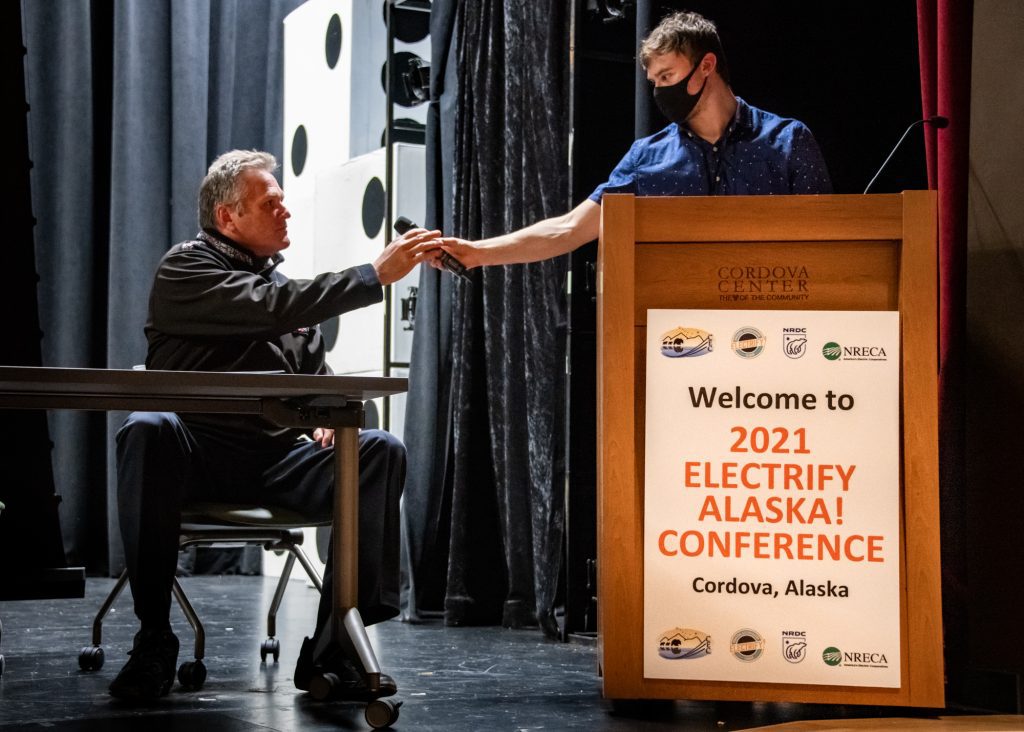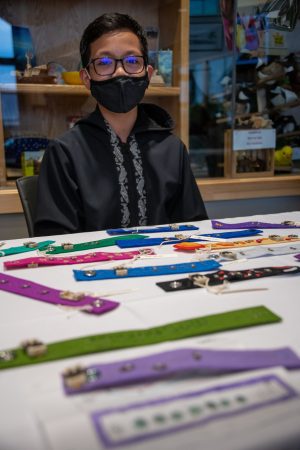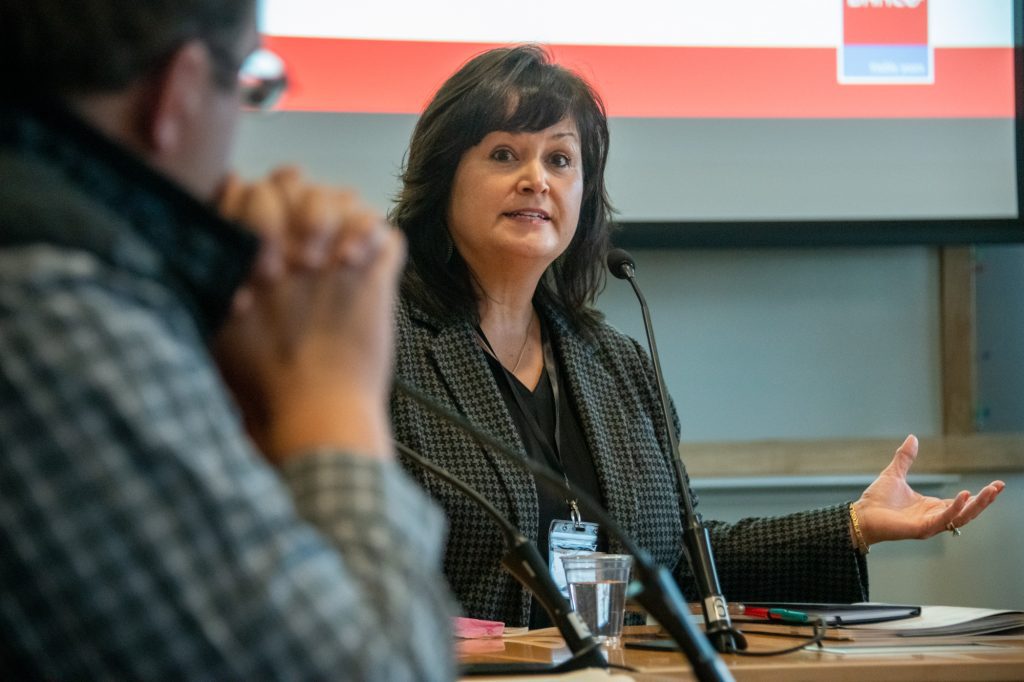Power players gather at Cordova Center: Energy Reps Envision an Alaska Less Dependent on Oil

From left, Gov. Mike Dunleavy receive a microphone from Cordova Jr./Sr. High School student Cody Shaw. (Oct. 25, 2021) Photo by Zachary Snowdon Smith/The Cordova Times
Oct. 25-28, science, tech and policy leaders gathered at the Cordova Center to discuss the potential for renewable energy to make Alaska less dependent on oil and oil-based fuels.
The Electrify Alaska! Conference included presentations and panel discussions on topics ranging from electric aircraft to small-scale nuclear power and tidal-powered hydrogen generators. The event was hosted by Cordova Electric Cooperative in partnership with Beneficial Electrification League, National Rural Electric Cooperative Association and the Natural Resources Defense Council.
Dunleavy talks renewables
The conference kicked off Oct. 25 with the screening of an unreleased short documentary produced by the BBC on Cordova’s use of energy-saving technology, and with a panel discussion including Gov. Mike Dunleavy. Dunleavy framed renewable energy development as an opportunity for Alaska to affirm its traditional individualism by decoupling Alaska’s fortunes from oil.
“What you’re seeing in Alaska are real attempts to cope with isolation, small scale and the desire to get out from underneath a commodity — oil — that is subject to market forces,” Dunleavy said.
Cordova Jr./Sr. High School student Cody Shaw, addressing Dunleavy on behalf of a group of students, asked the governor how his administration would assist in Alaska’s progress toward a more sustainable future, replacing diesel-driven technology with electric technology. In response, Dunleavy described the suffering inflicted on small communities that rely heavily on high-priced oil-based fuels, and emphasized the importance of ensuring that federal spending bills support the wellbeing of Alaska communities.
“We’re going to push (renewable energy), not because it’s the ‘cool’ thing to do, but because it’s the smart thing to do,” Dunleavy said. “It doesn’t matter if you’re a conservative or not, or if you’re a progressive. It doesn’t matter, in the end. We all win if the air is cleaner. We all win if the energy is cheaper.”
Dunleavy also announced that an Alaska sustainable energy conference would be held May 24-26 in downtown Anchorage. Dunleavy said he hoped the Anchorage conference would draw a variety of experts in the field, including “someone like Elon Musk.”
Dunleavy’s appearance at the conference was scheduled just a few days ahead of time, at his initiative, conference organizers said. Clay Koplin, mayor of Cordova and CEO of CEC, said he was impressed by how knowledgeable the governor was on energy issues.
“Usually, commissioners and staff are the subject matter experts, and I was amazed at the depth and breadth of the governor’s understanding of energy,” Koplin said.
Prior to the conference’s panel discussion, Dunleavy participated in a public roundtable in which he heard concerns about school funding and access to pre-kindergarten education.

Scientists, entrepreneurs and legislators
Speakers and moderators at the conference included representatives from Bye Aerospace, Hitachi, battery company Saft, the University of Alaska Fairbanks and Westinghouse Electric. Groups of high school students attended several discussions, including a presentation by Launch Alaska “Chief Innovation Officer” Rob Roys on electric boat and aircraft technology. Mt. Eccles Elementary School students also ran a display of handmade light-up bracelets.
Rep. Louise Stutes, R-Kodiak, and Sens. Dan Sullivan and Lisa Murkowski, both R-Alaska, also addressed the conference. Speaking via Zoom, Murkowski told attendees she saw Cordova as a “living laboratory” for energy technology, as well as a model for communities transitioning away from diesel fuel.
“Sometimes there’s a hesitancy to move forward too aggressively, because we’re still feeling our way through,” Murkowski said. That’s not what happens in Cordova.”
Ironically, the conference kickoff was interrupted by a 19-minute power outage. During the outage, visiting Electric Power Research Institute Vice President of Corporate Affairs Katie Jereza said she bumped into a local resident who assured her that the power rarely goes out for longer than 20 minutes.
“That’s a pretty good reliability record!” Jereza remarked.
Native Village of Eyak Tribal Council Vice Chairman Sylvia Lange and Chugach Alaska Corporation Chairman Sheri Buretta also participated in the conference, with Buretta taking part in a panel discussion on strategies for decarbonizing Alaska’s energy sector. Koplin praised Tribal organizations for taking what he described as a long view of energy issues.
“In energy, you’re investing in high-cost, long-life infrastructure, so you have to look out ahead and guess: What are we going to need tomorrow? Where do we want to be tomorrow?” Koplin said.
Food donated by 60° North Seafoods, Camtu’s Alaska Wild Seafoods, Copper River Seafoods, Ocean Beauty Seafoods and Trident Seafoods allowed attendees to dine on fresh seafood during meal breaks throughout the conference. Conference sponsors included Alaska Airlines, Cobank, Hitachi, Mitsubishi, the National Rural Electric Cooperative Association, the Natural Resources Defense Council and Saft, organizers said.
Next year’s Electrify Alaska! Conference will likely be held in Kodiak, Koplin said.

COVID-19 infection
One conference participant experienced mild COVID-19 symptoms Friday, Oct. 29 and tested positive for the virus Monday, Nov. 1, said conference coordinator Kristina Baiborodova. During the conference, participants were required to wear masks other than when eating or drinking or when speaking to an audience.
The Electrify Alaska! Conference was held for the first time in 2020. However, that year, the event was staged entirely online as a precaution against COVID-19 transmission.
This article was originally posted on the website of Launch Alaska.